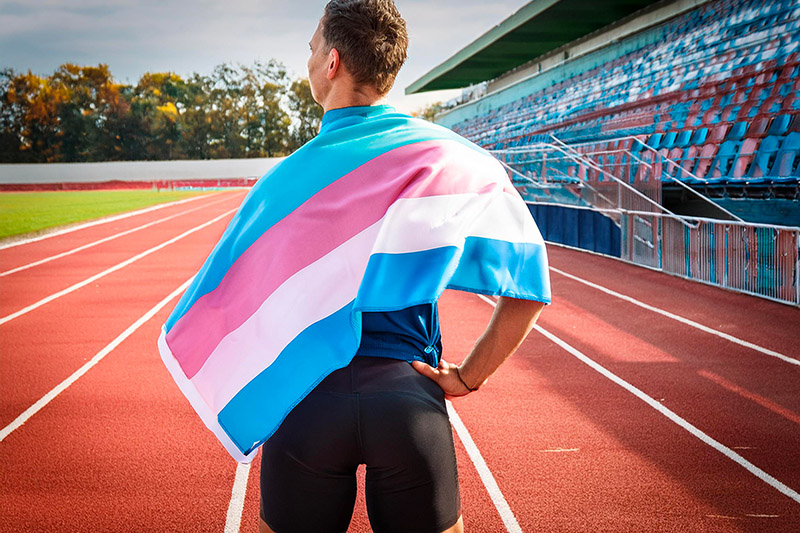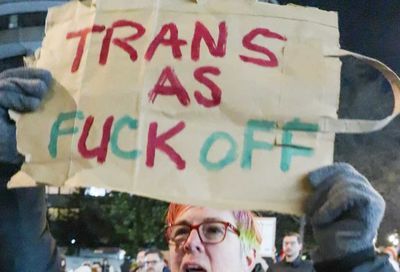Two House Democrats Oppose Trans Athletes in Women’s Sports
Tom Suozzi and Seth Moulton's comments come as pundits are blaming transgender issues as one reason voters rejected Harris.
By John Riley on November 12, 2024 @JRileyMW

Two sitting Democratic congressmen came out publicly against allowing transgender females to compete on women’s sports teams.
This continues an alarming trend of people on the political Left blaming LGBTQ visibility as one of the reasons for Republican victories in this year’s elections.
Following Donald Trump’s win in the presidential race and the start of post-election analyses to determine why most voters shifted heavily away from the Democratic party, U.S. Rep. Tom Suozzi (D-N.Y.) told The New York Times that the party “have to stop pandering to the far left.”
Unsurprisingly, Suozzi, who represents a socially conservative swath of Long Island once represented by former Republican U.S. Rep. George Santos, fixated on transgender issues as the chief cause of voters’ widespread rejection of Democrats.
Suozzi appeared to dismiss the role that other factors — including a sluggish economy, inflation, higher prices of consumer goods, or concerns about unchecked immigration and perceptions of rising crime — played in voters’ rightward shift, despite those issues being much more omnipresent in people’s daily lives than transgender rights — especially since a majority of Americans have told pollsters they have never met a transgender person.
“I don’t want to discriminate against anybody, but I don’t think biological boys should be playing in girls’ sports,” Suozzi said. “Democrats aren’t saying that, and they should be.”
Meanwhile, U.S. Rep. Seth Moulton (D-Mass.) lambasted members of his party for kowtowing to political correctness.
“Democrats spend way too much time trying not to offend anyone rather than being brutally honest about the challenges many Americans face,” Moulton told the Times. “I have two little girls, I don’t want them getting run over on a playing field by a male or formerly male athlete, but as a Democrat I’m supposed to be afraid to say that.”
Moulton previously co-sponsored proposed legislation for a “Transgender Bill of Rights” that would have allowed trans athletes to compete on sports teams that align with their gender identity.
He also voted against a bill to change Title IX — the law governing sex-based discrimination in educational settings and sports — to recognize the term “sex” as “based solely on a person’s reproductive biology and genetics at birth,” which was approved by House Republicans on a party-line vote.
A spokesperson for Moulton’s office said his comments to the Times were meant to illustrate Democrats’ over-reliance on identity politics, but refused to answer questions about whether Moulton has changed his previous positions on transgender participation in sports or transgender issues in general.
Suozzi and Moulton’s comments come after an election in which Republicans, including President-elect Donald Trump, spent at least $215 million on attack ads using transgender athletes in sports and support for gender-affirming care for transgender people as wedge issues.
Shocking no one, many allegedly “liberal” pundits piled on, with Bari Weiss, founder and editor of The Free Press — who has promoted anti-transgender narratives in the past — accusing Democrats of running on “niche issues like gender fluidity and ‘defund the police.'”
Weiss’s claim ignores the fact that Kamala Harris and other Democrats largely shied away from addressing transgender issues — mentioning transgender rights in only one speech before the LGBTQ rights group the Human Rights Campaign — and that many Democrats, from Harris down to local-level politicians attempted to cast themselves as tough on crime and in favor of stricter border policies.
However, what Weiss may be referring to is that the Democratic “brand” is viewed by most voters as inseparable from not only transgender rights but identity politics and political correctness.
Similarly, people who support transgender rights were subjected to a hectoring lecture from MSNBC Morning Joe hosts Joe Scarborough and Mike Brzezinski about how transgender issues cost Democrats the election, as reported by The Advocate.
Scarborough said that the anti-transgender ads run by Republicans this election cycle, particularly Trump’s attack against Harris for supporting gender-affirming care for trans prisoners, “had a bigger impact than any ad than ran.”
He implied that the ads resonated with many groups that shifted heavily towards Trump, including rural voters, younger males, and Hispanic and Black voters. Scarborough also opined that the issue alienated even Democratic-leaning voters who are opposed to trans visibility but fear being “canceled” for saying something “politically incorrect.”
Brzezinski also read aloud an op-ed from New York Times columnist Maureen Dowd lecturing Democrats for caving to “wokism” and “identity politics,” citing transgender athletes in sport as one of the drivers of this anti-Democratic sentiment.
When confronted with the rhetoric blaming Democratic losses on the party’s perceived stances on transgender-related issues, Brandon Wolf, press secretary of the Human Rights Campaign, told The Hill in a statement, “We will spend years analyzing the results of this election and building a winning coalition for the cycles to come, but we know this: blaming those who have long been in the MAGA crosshairs won’t help us build the path forward.”
Wolf also cited exit polling showing that only 4% of voters considered opposition to transgender athletes and gender-affirming care as the most important issue in the election.
At the same time, while trans issues may not have been a top issue for most voters, Republican attacks using transgender issue as a “stand-in” or “shorthand” for Democrats’ perceived leftward shift on cultural issues — such as diversity, equity and inclusion (DEI) efforts, identity politics, political correctness, and language-policing — may have found fertile ground in the minds of some voters.
According to a post-election survey by the Democratic firm Blueprint, the top three reasons why voters chose not to vote for Kamala Harris were, in order, that “inflation was too high under the Biden-Harris Administration,” that “too many immigrants illegally crossed the border under the Biden-Harris Administration,” and that “Kamala Harris is focused more on cultural issues like transgender issues rather than helping the middle class,” with 67% of respondents picking the latter as one of their top reasons for voting against the Democratic presidential nominee.
Transgender advocates are pushing against the scapegoating rhetoric.
“Please do not blame trans issues or trans people for why we lost,” Sam Alleman, the Harris campaign’s LGBTQ engagement director, wrote on X. “Trans folks have been and are going to be a primary target of Project 2025 and need us to have their backs now more than ever.”
Similarly, transgender journalist Erin Reed noted on her “Erin in the Morning” Substack that the fight for transgender equality — and ultimately, societal acceptance — was always going to be a longer, more drawn-out, generational fight.
She urged her followers to continue to push for change, and urged them to take care of themselves, even advising trans people to stockpile medication and update their identity documents to protect themselves against future legislation furthering restricting transgender rights.
“I don’t know how long this setback will last,” Reed wrote, “and I’m almost certain it won’t be our last.”
A Second Judge Blocks Trump’s Anti-Trans Health Care Orders
A Maryland judge finds that transgender plaintiffs and their families are likely to succeed in proving the orders are unconstitutional.
By John Riley on March 5, 2025 @JRileyMW
A federal judge issued a nationwide order blocking a pair of executive orders from President Donald Trump seeking to criminalize the provision of gender-affirming health care to transgender youth.
U.S. District Judge Brendan Hurson, of the District of Maryland, granted a preliminary injunction to the families of several transgender young adults and adolescents whose access to gender-affirming care was disrupted by Trump's orders. Those families are joined by the pro-LGBTQ advocacy group PFLAG National and GLMA, the country's largest organization of LGBTQ and allied health professionals.
U.S. Halts $175 Million for UPenn Over Trans Athlete
The Trump administration has paused federal funding for the University of Pennsylvania for allowing a transgender swimmer to compete in 2022.
By John Riley on March 20, 2025 @JRileyMW
The Trump administration suspended $175 million in federal funding for the University of Pennsylvania as punishment for having allowed transgender swimmer Lia Thomas to compete in 2022.
Thomas originally competed for the men's swim team but competed on the women's team following her transition.
She complied with what NCAA regulations regarding transgender athlete eligibility were at the time, undergoing hormone therapy for a year before competing.
In 2022, Thomas began breaking school and meet records, becoming the first transgender woman to win an NCAA swimming championship medal in the Division I women's 500-yard freestyle event.
Philadelphia Schools Defy Trump Trans Athlete Ban
The School District of Philadelphia will refuse to comply with President Trump's order to bar transgender athletes from female sports.
By John Riley on March 3, 2025 @JRileyMW
The School District of Philadelphia announced it will defy President Donald Trump's executive order prohibiting transgender athletes from competing in women's sports.
This move contrasts with the actions of the Pennsylvania Interscholastic Athletic Association, the governing body of K-12 sports in the Keystone State.
The PIAA revised its policy to comply with Trump's executive order, replacing references to a student's "gender" with sex. It removed principals' authority to make a final determination regarding a student's sex and allowed a school to determine it (presumably based on the gender marker on school records and birth certificates, although the policy lacks specifics).
Support Metro Weekly’s Journalism
These are challenging times for news organizations. And yet it’s crucial we stay active and provide vital resources and information to both our local readers and the world. So won’t you please take a moment and consider supporting Metro Weekly with a membership? For as little as $5 a month, you can help ensure Metro Weekly magazine and MetroWeekly.com remain free, viable resources as we provide the best, most diverse, culturally-resonant LGBTQ coverage in both the D.C. region and around the world. Memberships come with exclusive perks and discounts, your own personal digital delivery of each week’s magazine (and an archive), access to our Member's Lounge when it launches this fall, and exclusive members-only items like Metro Weekly Membership Mugs and Tote Bags! Check out all our membership levels here and please join us today!
The Magazine
-
Most Popular
 'Porn Star University' Started by Gay-for-Pay Creator Andy Lee
'Porn Star University' Started by Gay-for-Pay Creator Andy Lee  Utah Bans the Pride Flag
Utah Bans the Pride Flag  Anheuser-Busch Abruptly Ends Sponsorship of St. Louis PrideFest
Anheuser-Busch Abruptly Ends Sponsorship of St. Louis PrideFest  Gay Congressman Chris Pappas Poised to Launch Senate Bid
Gay Congressman Chris Pappas Poised to Launch Senate Bid  Becca Balint Introduces Trans Health Care Bill
Becca Balint Introduces Trans Health Care Bill  Gay Porn Star Tim Kruger Dead at 44
Gay Porn Star Tim Kruger Dead at 44  The Commanding Style of Nathan Lee Graham
The Commanding Style of Nathan Lee Graham  Trump Targets Law Firm for Defending Transgender Rights
Trump Targets Law Firm for Defending Transgender Rights  Popular Music: Spring Arts Preview 2025
Popular Music: Spring Arts Preview 2025  Texas Man Fires Gun at Relative Who Came Out as Gay
Texas Man Fires Gun at Relative Who Came Out as Gay
 Becca Balint Introduces Trans Health Care Bill
Becca Balint Introduces Trans Health Care Bill  Gay Congressman Chris Pappas Poised to Launch Senate Bid
Gay Congressman Chris Pappas Poised to Launch Senate Bid  Utah Bans the Pride Flag
Utah Bans the Pride Flag  3 Million People Could Die Due to HIV Funding Cuts
3 Million People Could Die Due to HIV Funding Cuts  Celebrities Urged to Boycott Hungary Over Pride Ban
Celebrities Urged to Boycott Hungary Over Pride Ban  The Commanding Style of Nathan Lee Graham
The Commanding Style of Nathan Lee Graham  Texas 'Sexual Content' Bill Would Criminalize Literary Works
Texas 'Sexual Content' Bill Would Criminalize Literary Works  Awesome Con Celebrates the Geek in All of Us
Awesome Con Celebrates the Geek in All of Us  Win Tickets to Awesome Con!
Win Tickets to Awesome Con!  Film: Spring Arts Preview 2025
Film: Spring Arts Preview 2025
Scene
Metro Weekly
Washington's LGBTQ Magazine
P.O. Box 11559
Washington, DC 20008 (202) 638-6830
About Us pageFollow Us:
· Facebook
· Twitter
· Flipboard
· YouTube
· Instagram
· RSS News | RSS SceneArchives
Copyright ©2024 Jansi LLC.












You must be logged in to post a comment.